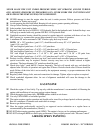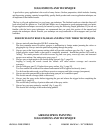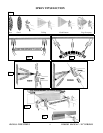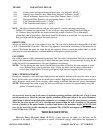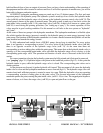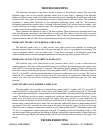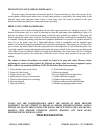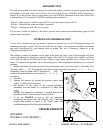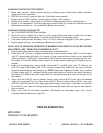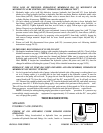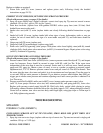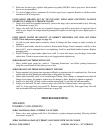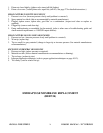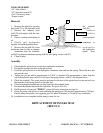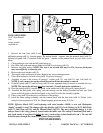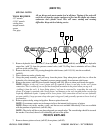
H.E.R.O. INDUSTRIES 1150GSD MANUAL - “B” VERSION
17
GASOLINE ENGINE WON'T START/RUN
1. Pump under pressure. (reduce pressure setting by turning pressure control knob counter-clockwise,
trigger gun to relieve pressure).
2. Fuel line valve closed. ( open fuel line valve. See Honda owners manual ).
3. Engine switch in “OFF” position. ( turn the engine switch to “ON” position ).
4. Engine out of gasoline. ( allow engine to cool, before adding appropriate levels of unleaded gas ).
5. Engine is oil contaminated. Unit and engine must remain vertical or oil from the crankcase can enter
the carburetor, air filter etc. ( see an authorized Honda service center ).
GASOLINE ENGINE STALLS/QUITS
1. See "GASOLINE ENGINE Won't Start/Run
2. Drive belt is loose. (tighten drive belts by evenly turning belt tension bolts on either side of engine
clockwise. Check tension frequently. Loose belts generally emit loud squealing noises).
3. Unit primes, builds pressure, but pump “seizes” or “stops” when gun is triggered. ( loose belts, tighten).
4. Engine requires tune-up. ( see an authorized Honda service center ).
TOTAL LOSS OF PRESSURE, HYDRAPULSE MEMBRANE MOVEMENT CANNOT BE STOPPED
OR ALTERED. (SEE "HYDRAPULSE MEMBRANE TEST")
1. Paint too thick. (thin paint according to manufacturer's recommendations).
2. Intake ball (ref# 14) worn or jammed opened/closed. (remove intake endcap (ref# 11) and ball guide
(ref# 17). Inspect intake ball,(ref# 14), to ensure it is free, round, and has no nicks or cuts. Inspect ball
guide for excessive "bashing out" on the internal walls. Excessive wear causes the ball to become "lost"
and unable to locate the seating surface. Inspect for foreign material jamming ball. Replace parts as
needed).
3. Intake seat loose/bypassing. (remove intake endcap,(ref# 11) and ball guide, (ref# 17). Remove seat
(ref# 13), inspect inlet washer (ref# 12) for excessive compression. Inspect for any sign of material
bypass between intake seat and endcap cavity. NOTE; The proper alignment of intake parts, condition
of intake washer (ref# 12), combined with the correct bolt torque are critical to the correct function of
the intake valve. Replace the intake washer (ref# 12), each time the endcap is removed. See page 23 for
more details.
4. Outgo valve ball (ref# 30) worn or jammed. (remove outgo valve,(ref# 26). Invert valve and unthread
outgo valve upper,(ref# 31), from outgo lower,(ref# 27). Remove crush washer,(ref# 28), outgo seat,
(ref# 29), outgo ball,(ref# 30), from outgo upper tunnel. Inspect outgo ball to ensure that it is round and
free of nicks or cuts. Inspect for foreign material jamming ball. Inspect ball and cage for wear. Replace
parts as needed).
5. Outgo valve (ref# 26) incorrectly assembled. (disassemble and reassemble outgo valve, closely
following detailed instructions on page 26).
TROUBLESHOOTING
SITUATION
POSSIBLE CAUSE (REMEDY)



